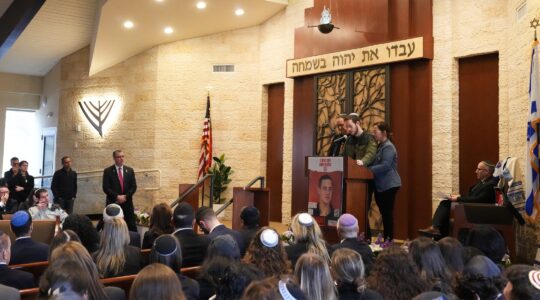Set to coincide with Palestinian President Mahmoud Abbas’s bid for statehood at the U.N., Hillel International is officially pitching its "Talk Israel" tents today across twenty college campuses to promote dialogue about Israel.
"This idea for tents predates the [current protest] tents in Israel," explained Sharon Ashley, a journalist by training who now heads Hillel’s Center for Israel Engagement. "It dates back to the assassination of Yitzhak Rabin. Right afterwards, an organization in Israel set up tents all over the country for dialogue."
[[READMORE]]
Working as an editor for The Jerusalem Report in Nov. 1995, Ashley and her colleagues ran to the office to start filing reports. While she didn’t manage to enter the tents at the time, they concept left an impression on her.
"The country was still at war with itself," Ashley recalled, alluding to conflict between the political left and right as well as between secular and religious Israelis. "People weren’t talking with one another. On the anniversary of the assassination for many year the tents reappeared and people would talk."
Indeed, one of these tents was used as a lead in a JTA story in 1999:
Anniversary of Rabin Assassination Used As a Chance to Heal Israeli Rifts (published: Oct. 21, 1999)
By Naomi Segal
JERUSALEM, Oct. 20 (JTA) – Four years after the assassination of Prime Minister Yitzhak Rabin, Israelis are still grappling with the social chasm the murder revealed.
In an effort to heal some of those rifts, secular and religious youths attempted, if only for a day, to seek out what unites them.
As commemorations began Wednesday, hundreds of high school students met in a "dialogue tent" set up in the Tel Aviv square where Rabin was slain.
The images of ponytailed secular teens exchanging words with their religious counterparts provides some signs of encouragement that the gaps separating Israelis might one day diminish.
"We still may not agree, but perhaps we understand that the dismantling of settlements may be incredibly painful for one side, while making another side happy," one participant told Israel Radio. (Full article)
Ashley was not aware of an even earlier precedent for these tents, a "peace tent" pitched at the 1985 NGO Forum in Nairobi that spurred heated but calmly rebutted rhetoric about the Middle East:
Special to the JTA: Views on the Mideast Exchanged at International Women’s Meeting
By Nancy Miller
NAIROBI, Kenya, Jul. 14 (JTA) – More than 500 women crammed into an oversized striped Peace Tent on the campus of the University of Nairobi to hear a Palestinian sociologist, an Israeli professor of women’s studies, an American Jewish freelance journalist, and a British Jewish Non-Governmental Organization (NGO) delegate sympathetic to the Palestinian cause exchange their views on the Middle East.
The program was one of hundreds planned for the NGO Forum ’85 on women which began here last Wednesday and ends tomorrow. The meetings of the NGOs, which include many Jewish organizations, are meeting in conjunction with the 12-day world conference ending the United Nations Decade for Women.
After each panelist delivered a 10-minute speech, dozens crowded the podium to comment. Many spoke in familiar terms about the horrors of apartheid, racism, and Zionism. Yhan Melou, a representative of the General Union of Palestinian Women, noted to the approval of the meeting, that "Zionism is racism. We do not say this because we like to condemn Zionism, but it is a fact."
Despite the jingoistic cant, distressing as it was to the Jewish and Israeli delegates, this meeting was noteworthy for its orderliness and self-control. (Full article)
"In a time of challenges to Israel; one of the things that is needed is civil dialogue," said Ashley, echoing a concept that Hillel has been advancing since 2008.
In its latest push for a civil discussion, Hillel is taking measures to provide a calm and homey environment. Tents provided by the CIE will offer an open aesthetic with no walls and comfy furniture. Professional facilitators will ensure that guidelines for for respectful conversation — to be posted in the tent alongside each university’s code of conduct– are being followed.
"This is not an advocacy tent," stressed Ashley. "This is not a moment for pontification and for fliers; this is a moment for educating and engaging; we’re promoting a different mode of discourse in this tent."
Pressed as to whether "Zionism is racism," accepted in the ’85 NGO Forum tent, might be deemed off-limits here, Ashley began by articulating Hillel’s position. "The tents say, ‘Talk Israel; Join the conversation.’ Hillel supports a safe and secure Israel recognized in the family of nations. If you disagree about that, this isn’t the conversation for you."
"I’m not out to censor people," she added. "What will ensue hopefully in these tents is dialogue, it isn’t a place where people come to rant. Israel has a right to exist, and now let us discuss the problems that changing the Middle East landscape poses for the future of the region."
Photo: Inside the Hillel Talk Israel tent at McGill University (Courtesy of Shira Prigat).
JTA has documented Jewish history in real-time for over a century. Keep our journalism strong by joining us in supporting independent, award-winning reporting.






